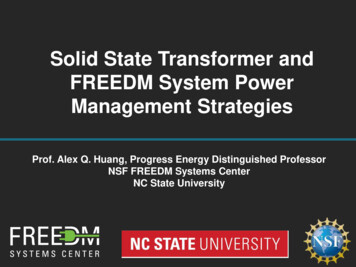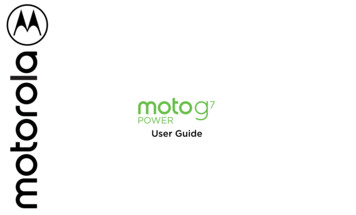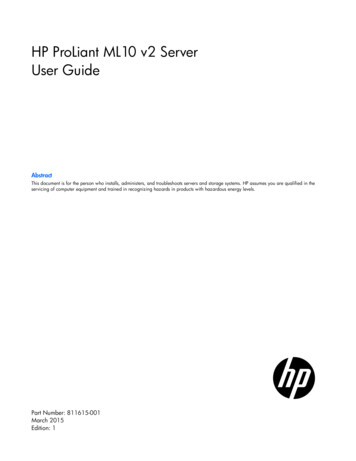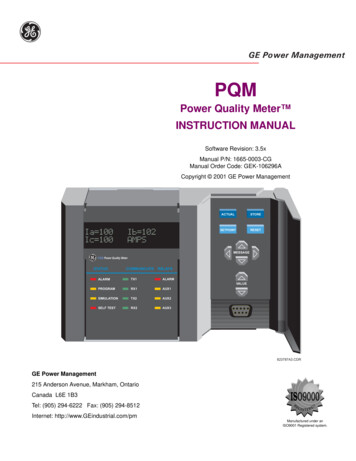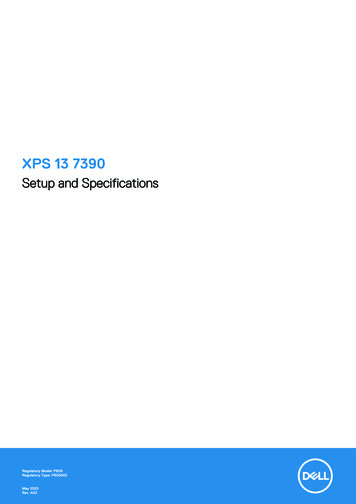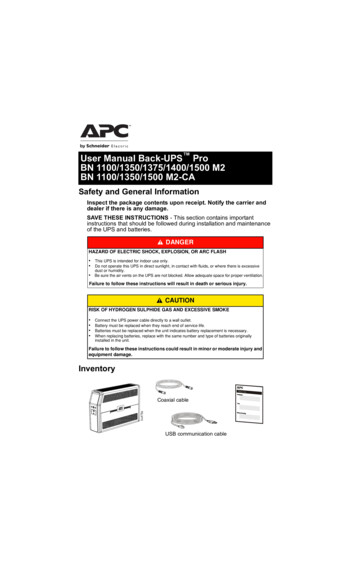
Transcription
It’s all aboutpowerA guide to thinking differently aboutpower for solidarity in social change
It’s all about powerThis guide is the culmination of a two-year collaborative inquiry,the Power Project, hosted by Sheila McKechnie Foundation.In all, over 300 people contributed to this inquiry in bigand small ways. We are incredibly grateful to everyone whohas taken part in a workshop, responded to requests forconversations, interacted with blogs and newsletters andhelped in countless ways.While we at SMK take full responsibility for the contents ofthis guide, many different people and forms of knowledge haveenriched our thinking. We are particularly grateful to all thosewho shared knowledge, insights and perspectives gained fromtheir own first-hand experience of poverty and inequality.This guide could not have been possible without thecollaboration and contributions of our Core Learning Group,whose commitment to inquiring alongside us has shapedboth the process and outcomes of this project:Alice SmithLucie RussellPaula HarriottBushra AhmedMairead O’SiochruSophie Wills-VirkDan BoydenMurshad HabibTony CealyTrust for London and City Bridge Trust funded the projectthrough the Cornerstone Fund.March 2022Designed by Brand Ethos1
“Solidarity does not assumethat our struggles are thesame struggles, or that ourpain is the same pain, or thatour hope is for the samefuture. Solidarity requirescommitment, and work, aswell as the recognition thateven if we do not have thesame feelings, or the samelives, or the same bodies, wedo live on common ground.”Sara AhmedChange-makers are passionate about what they do and wantto get it done, for everyone’s sake. But trying to drive changeon behalf of others isn’t working. In fact, it is perpetuating thevery inequalities it is trying to address. Learning to worktogether, in active solidarity, when our experiences, insightsand ideas might be very different, is hard – but it is a criticalchallenge of our time. We think understanding power can help.The challenge facing the social sector is systemic – there is noone-size-fits-all approach. This guide shares insights and toolsto help you see power more clearly. But transforming powerdynamics, to achieve meaningful solidarity for more effectiveand more legitimate social change, requires a commitmentfrom everyone.Why power? makes the case for a conversation about power,and shares what we heard about people’s experience ofengaging with the social sector.See power introduces the Power Lens, a tool for seeingpower in civil society more clearly.Transform power introduces the Power Framework, a toolfor creating a strategy to transform power in your work – andshares some suggestions for action revealed by our inquiry.Unleash power is a call to reflective, responsive action – foreach of us to play our part in building a powerful sector whereeveryone feels they can belong.How to think differently about power is where you come in.We share some activities to help you think differently aboutpower, and to achieve more meaningful solidarity in your workfor social change.Endnotes and a glossary are included at the end to point youto some of our sources, and definitions of some of the key wordsthat feature in this guide.2It’s all about powerIt’s all about power3
Contents4Introduction73. Transform power43Introduction8Tools: The Power Framework44About the Power Project11Insights: Taking action to transform power46Power and the Power Project12Develop consciousness and capabilities48Who is this guide for?13Share resources521. Why power?15Create inclusive cultures56The lens of lived experience16Rethink policies and governance61Trying to share power174. Unleash power67Insights: Engaging with the social sector18Power, and opportunities for change, are everywhere68Why we need to talk about power24Towards a more powerful civil society69What is power?26Thinking differently about power285. How to think differently about power71Activities: Over to you722. See power31Talk about power74Tools: The Power Lens32See power more clearly80Individual power34Create a strategy to transform power90Collective power36Civil society’s power38Glossary94Societal power40Endnotes and further reading96Acknowledgements98Notes99It’s all about powerContents5
Introduction“Where we are born into privilege,we are charged with dismantlingany myth of supremacy. Wherewe are born into struggle, we arecharged with reclaiming ourdignity, joy and liberation.”Adrienne Maree Brown6It’s all about power7
IntroductionSomething has shifted. Increasingly, social sector organisationsare realising that old models of ‘charity’ and ‘philanthropy’ areno longer working.The idea that people with ‘lived’ or ‘first-hand’ experience ofpoverty and other forms of inequality have an essentialperspective on how best to change things – mostly unthinkablenot so long ago – is now firmly on the table. People are speakingup, rightly making demands to be included. Many working withinthe social sector in their pursuit of change, hope to be betterallies to those with first-hand experience, but don’t always knowhow best to go about it.1Over the last two years, the Sheila McKechnie Foundation hashosted an inquiry that began with the question, ‘How can wegrow the voice of those with first-hand experience of povertyand inequality in social change?’On the face of it, this was a good and simple question. But, inconversations with people from across civil society, it becameclear it was not. In fact, in trying to answer it, every aspect of thequestion itself was challenged – from the language that frames itto the assumptions it reveals.Those challenges shed light on how, despite good intentions,current attempts to work in solidarity with people with direct,first-hand experience of social issues often fall woefully short.Those with first-hand experience told us that, too often, theirexperience is used in ways that are tokenistic, or evenexploitative. The formal social sector is not always a welcomingplace and examples of genuine, equitable partnerships are rare.As a result, many people prefer to pursue change outside thesocial sector, to ensure their mission is not compromised andtheir experiences are not co-opted. Some are achievingconsiderable success. Imagine what could be achieved together.8It’s all about powerWhat we have heard represents a critical challenge tothe integrity and effectiveness of the social sector.Anyone with experience of working for social justice will knowthat deep, systemic causes are at play. Systems are hard tochange – the status quo tends to ‘snap back’. Changes to policyor practice alone rarely offer long-term solutions. Every part ofthe system needs to shift, including those who are working tomake that shift happen.Efforts to create lasting, systemic change are underminedwhenever anyone unthinkingly amplifies negative stereotypesof victimhood, ‘deserving poverty’ or individual heroism. Toomuch focus on ‘empowering’ others can paradoxically reinforcean unequal relationship and, without a willingness to marshalresource and expertise in support, risks putting the burdenof solving social issues directly on the shoulders of thosemost affected.The challenge of creating a fairer, more equitable social sectoris systemic. To create a systemic shift, we need a way to see thesystem more clearly. There is no better lens for this job than thelens of power.All inequality, and all exclusion, is an inequality of power. Itinfuses and shapes every relationship and decision: betweenpeople, across networks, within and between organisationsand institutions.It’s all about power is an invitation to the social sector to join usin a project to see power more clearly and to develop strongerstrategies to transform it. We have developed and curated toolsto explore how power manifests in yourself and in the groups andorganisations you are part of, and to consider how this powerinteracts with the structures and cultures of power in society.Introduction9
About the Power ProjectOur Social Power report encouraged a more complex, systemicunderstanding of social change. We hope It’s all about powerwill encourage a more complex, systemic understanding ofpower that will result in a fairer, more equitable social sectorand a stronger civil society. Taken together, we believe theyare the catalysts to unleash civil society’s ‘social power’.The social sector can no longer act as the ‘hero saviour’ ofVictorian philanthropic tradition. Instead, it needs to reimagineits work as an ally and partner. We believe that by embeddingsocial justice and communicating an understanding of power fordeeper solidarity in every part of the social change process, itcan be more relevant, effective, and authentic. The result will besomething that we sorely need in this moment – more humanconnections, stronger communities, and hope for change.“This is the best and most significantconversation about power I’ve everhad. We are all engaged with power,but we just don’t talk about it.”Project participantThe Power Project, so far, has been a two-year inquiry intopower in civil society.The project was funded by the Cornerstone Fund, a fundercollaboration set up to reduce inequalities and grow stronger,more resilient and thriving communities for a London that serveseveryone. Our inquiry focused on London – England’s mostunequal city – but drew on learning and conversations fromaround the world.As hosts of the project, our role at SMK has been to convenedifferent perspectives and make sense of what we heard.We did this by: Establishing a diverse Core Learning Group, who met regularlyto help steer the project and to guide, challenge and extendour thinking. Inviting people to join a Community of Practice (currently300 strong), communicating our thinking and resourceswidely, through a digital pinboard, blog and e-newsletters. Hosting workshops for around 150 people – working inpartnership with Community Researchers to reach localcommunities, working with staff from social sectororganisations and campaign groups, and conveningindividuals from the Community of Practice. Conducting more than 50 interviews and informalconversations with people pursuing change from withintheir communities, social movements, social sectororganisations and in academia. Undertaking a literature review of power and socialchange, from the UK and further afield.All project participants contributing to workshops or the CoreLearning Group, who were not joining as part of a salaried role,were paid for their time.10It’s all about powerIntroduction About the Power Project11
Power and the Power ProjectWho is this guide for?We have been keenly aware of our power as hosts and authorsof the project. SMK is a social sector organisation, and our coreproject team is female, predominantly white and universityeducated – reflecting the wider make-up of the social sector.While we have sought to interrogate and challenge ourassumptions, our understanding can only ever be partial andsituated in our own point of view.Anyone serious about social change can benefit from a betterunderstanding of power. SMK champions civil society in allits forms – from large organisations to small neighbourhoodgroups. We hope this guide has value for everyone but,fundamentally, this is for people working in the social sector.Power is a complex and sensitive topic, open to multipleinterpretations. Rather than define power, poverty, and inequalityup front, we asked people to decide whether the inquiry wasrelevant to them. Our conversations quickly revealed howentwined poverty is with other forms of inequality – such asracism, sexism, homophobia, ableism, classism, and others.In short, we heard how power and inequality manifest in realand sometimes devastating ways in people’s lives.The knowledge we have gathered is not ‘fact’ or ‘truth’, butpersonal experience and testimony. Our closest collaborators,our Core Learning Group, joined us for what became a courageousjourney of personal and collective reflection. Insights fromthis journey have been instrumental to our understanding ofsolidarity as an active, collaborative process, requiringcommitment and work.The process of deciding what to share here – whose knowledgecounts – has raised questions that cut to the heart of this inquiry.While our preference would be to value and acknowledge allsources equally, many project participants shared theirexperiences openly on the basis that quotes would be usedbut not named.To make sense of what we heard, we read widely and drew onthinking from other contexts – particularly feminist activists inthe global South. The sources we found most helpful are listedin the Further Reading section at the end of this guide.12It’s all about powerAs our conversations unfolded, we repeatedly found significantchallenges in the relationships between formal social sectororganisations and people with first-hand experience of socialissues. This guide suggests how we might address them.The challenges are systemic. They can’t be resolved by anyonein a single role (eg an Engagement Officer). Change requiresa reimagining of relationships and processes both within andbetween organisations and communities, and a reckoning ofthe deep social inequalities that run through the very sector thatexists to address them. Whether you work in service delivery,fundraising, communications, policy, leadership, governance, orgrant-making, you have a role to play. We think understandingpower can help.“You can’t put responsibility to fix a systemon the people who are on the receiving endof it. People in positions of power need to taketheir responsibility seriously and use it well.”Project participantLots of people told us they didn’t want a report, they needed apractical guide to action. This desire for straightforward solutionsmakes sense, but we have learned that there is no one-size-fitsall approach. So, this is not a ‘how to’ guide. We share insightsand tools to help you see power more clearly and create astrategy to transform power, but then it’s over to you to makethe commitment, and do the work that’s needed in your context,to achieve deeper solidarity for social change.Introduction Power and the Power Project & Who is this guide for?13
1. Why power?“There’s really no such thingas the ‘voiceless’. There’s onlythe deliberately silenced, orthe preferably unheard.”Arundhati Roy14It’s all about power15
The lens of lived experienceTrying to share powerWe started with the question, ‘How can we grow the voiceand influence of Londoners with lived experience ofpoverty and inequality?’In our early conversations, the theme of power was everpresent. Who has power? How are they using it? Can itbe shared? We reframed our question to ask, ‘How cancivil society be better at sharing power, and how couldwe get there?’Everyone we spoke to agreed that the knowledge and insightsof people with first-hand experience of social issues should beat the centre of solutions to poverty and inequality. ‘Learned’or ‘professional’ knowledge is afforded greater status in oursociety, but it is insufficient when it comes to tacklingentrenched problems. However, our question, and theassumptions it revealed, was challenged.Not everyone we spoke to who had first-hand experience ofpoverty and inequality wanted to be labelled a person with ‘livedexperience’. Some reported having both ‘lived’ and ‘learned’experience. Others questioned whose voices of those withfirst-hand experience are really seen to count, and how longinsights from ‘lived experience’ could really be seen to last.“The moment we develop professionalskills our lived experience stops counting.We never forget how it feels to have the fearof poverty the brown envelopes arriving.”Project participantSome people expressed concern that focusing on individualexperience detracts from the collective, and political, causesof inequality.Once again, we hit the limits of our question. It implies thatpeople with first-hand experience don’t already have power andthat they are somehow entirely separate from civil society. Civilsociety includes individual campaigners, community groups,global social movements, charities, religious groups and others.Among them are people with first-hand experience of inequalitywho are already driving change. They are doing so in bothprofessional and voluntary capacities. It’s simply not true thatthey are waiting for someone else to share power with them.We found examples of people organising and campaigning intheir communities, delivering or transforming services, shiftingthe dial on narratives in the media and public sphere, andinfluencing decisions and policies on a local and national level.Throughout history, some of the most impactful change – fromwomen’s suffrage to Black Lives Matter – has been driven bypeople with first-hand experience of inequalities.Transformative social change has overwhelmingly started in civilsociety – but not always in formal social sector organisations.We began to doubt our question. Who decides who is a personwith lived experience, and when their experience counts? Whatdoes it mean to try and ‘grow’ someone else’s voice andinfluence? We began to see how much the language – ourlanguage – around addressing inequality could be perpetuatingit. We needed a new question, and a broader lens.16It’s all about power1. Why power? The lens of lived experience & Trying to share power17
Many people with first-handexperience feel excludedInsights: What we learnedEngaging with thesocial sectorWe know that some social sectororganisations led by people withoutfirst-hand experience of poverty andinequality are working in meaningfulsolidarity with individuals andcommunities to achieve socialchange together. But time and againwe heard that this kind of positiveengagement is the exception, notthe norm.18It’s all about powerTheoretically, the formal social sector offers access to funds,relationships and knowledge. Yet people told us they encounterbarriers to accessing these resources, in the form of burdensome,impenetrable or impossible processes.For many people, the sector is not a welcoming place to pursuechange. Cultures, social networks, language and jargon excludethem, and their time and knowledge are not valued.“If you don’t have resources, youcan’t apply for funds. It’s a catch-22.Then the bigger organisations ridein and don’t notice what’s alreadyhappening on the ground.”Project participant1. Why Power? Insights: Engaging with the social sector19
Others choose to pursuechange outside the sectorSome people opt out of engaging with social sector organisations,rather than compromise their mission or processes. They find theprocesses bureaucratic, hierarchical and at odds with the waythey choose to organise. Funding processes are inaccessible,time-consuming, or come with strings attached.These people are growing their own power, organising alongsideothers, influencing decision-makers, and making change in amultitude of ways.“The system doesn’t want to sharepower with us, so we turn to ourselvesto organise, and then we’re criticisedfor that. You’re damned if you do,damned if you don’t.”Project participantDespite concern about betterengagement, examples ofgenuine partnership are rareThe sector doesn’t look or sound like the communities it strivesto work with, which damages both legitimacy and trust.We heard that personal stories of first-hand experience areused by social sector organisations in tokenistic or exploitativeways. There was a perception that these stories were supportingfundraising efforts, but not achieving any real change.We also heard how successes won by people outside thesocial sector can be co-opted by organisations for their ownreputational gain.Social sector staff told us they want to do better but cannot doso unilaterally – internal cultures, policies and practices workagainst them. Time, money, expectations and attitudes meanthey struggle to create authentic spaces for collaboration. Asa result, they are also unsure when it’s right to speak ‘with’ or‘for’ people. And we heard different opinions from people withfirst-hand experience about whether it was OK for social sectorprofessionals to advocate on their behalf.“Lived experience becomes currency – ithelps charities get into powerful spaces.But it isn’t people with lived experiencewho benefit from that.”Bushra Ahmed, Core Learning Group20It’s all about power1. Why Power? Insights: Engaging with the social sector21
Opportunities for workingtogether can create as manyproblems as they solveProfessionals’ perception oftheir own power does not alwaysmatch the perception of othersPeople report being defined solely by their experience of aparticular issue. Their stories are made useful to an organisation– often to fuel a campaign or fundraising drive. But they remainexcluded from meaningful analysis, influence or decision-making,and from employment or governance opportunities.Social sector professionals told us their hands are tied – bypolicy or processes beyond their control, a lack of time, orthe requirements of funders. Those with first-hand experienceexpressed frustration that professionals often fail toacknowledge the power and privilege they do have.“It’s really traumatic to have to testifyover and over again. At the end of theday nothing changes, and you don’treally see anything shift. It’s not thatit’s not well intentioned, I think it is.But who still holds the power at theend of that process?”Alice Smith, Core Learning GroupThis dissonance reveals the systemic nature of the challengefacing the social sector. Too often, individual staff are taskedwith creating strategies for engagement and participation withoutthe wider support, understanding or resources required formeaningful change.“People don’t want to lose theirpower – but sometimes they don’teven know how much power theyhave. They’ve always had it andknow no different.”Project participant“People seem to think we have power,but it’s such a big organisation, there’sso much bureaucracy. We don’t havethe power people think we have.”Project participant22It’s all about power1. Why Power? Insights: Engaging with the social sector23
Why we need to talk about powerFailing to bring first-hand and learned knowledge and experiencemeaningfully together diminishes everyone’s power to shape thechange we need. We think taking the time to understand powercould be key to working out how to do better.People working in the social sector, including us at SMK, alreadytalk a lot about power. We talk about ‘empowering people’,‘speaking truth to power’ and, of course, ‘sharing power’. Butthese phrases can sound empty unless they’re backed up by amore nuanced understanding of power, and meaningful action.Talking about power can feel abstract, a distraction from thereal work of social change. And it can be uncomfortable. Butpower is everywhere, and it affects everyone. All inequality, andall exclusion, is an imbalance of power – and that applies as muchto the social sector as to society as a whole. Unless we take thetime to understand it, we can’t hope to transform it – and we’llcontinue making the same mistakes.Just talking about power won’t solve anything. But seeingimbalances of power more clearly, then taking reflective,strategic, power-aware action to shift that balance, just might.“Talking about powerseems simple, butactually it’s radical.It gets to the roots,shakes the foundationsof the charity sector.”Lucie Russell, Core Learning GroupWe’ve come to believe in the power of having an honestconversation about power itself, and we hope this guidecan ignite that conversation.24It’s all about power1. Why power? Why we need to talk about power25
What is power?This is not the first attempt to understand power for socialchange.2 There is a rich seam of thinking to draw on, and wecan’t hope to do all of it justice here. Power is understood bydifferent people in different, and sometimes contradictory,ways. It’s what academics call a ‘contested term’. But drawingon this thinking has led us to think about power in a new way. Power is the ability to create – or resist – change. At itssimplest, power is what we use to create or resist change,and what constrains our efforts to do so. It’s what creates thebarriers to inclusion in the social sector, and what we use toovercome them. Power itself is not ‘good’ or ‘bad’, it’s neutral. Power is systemic – it’s everywhere. It’s woven through allour relationships, from the intimate or domestic to the regionaland global. It’s in our families, communities, and workplaces,as well as in the institutions where decisions are made. Itaffects, and is affected by, our feelings, cultural norms, thedistribution of resources, and the formal rules and laws thatgovern us. Our position within this complex web of poweraffects both our experiences, and how we interpret them –and how we interpret other people’s experiences too. Power is dynamic – it’s contextual and intersectional.Power constantly shifts according to context and relationships.Someone who feels powerful in their family may feel powerlessat work. Aspects of our identity such as race, class, genderand disability combine in ways that are intersectional,affecting our access to sources of power – things like money,technology, information and social networks. Power is not finite – but it is accumulative. Power is not azero-sum game. If someone has more power, it doesn’t followthat someone else must have less. But access to sourcesof power can generate more access to more power. You’veheard the phrase ‘money makes money’? That, but with allkinds of power sources. This means it can take more effortto shift a power dynamic than to maintain it – the status quo‘snaps back’. Power is structural and cultural. Power dynamics areformalised through social structures – institutions such asgovernment, the law, the media, education and family. Andthey are upheld by the prevailing assumptions and socialnorms that shape how we make sense of ourselves andthe world. But power is also personal and interpersonal. Most of ushave experienced feeling both powerful and powerless asindividuals in different situations. Sometimes that’s becauseof our role or status in a group, or our relationship withanother person, but sometimes it’s more unexpected. Forsome, an experience of injustice becomes a source of power– driving a determination for change. For others, music, artor other creative or embodied experiences can spark theimagination and ignite a personal sense of power.If we reject binary ideas about ‘people with power’ and ‘peoplewithout’, and instead look at the dynamic ways that power flowsthrough and between us all, this creates a possibility. Power isn’tsomething to be parceled out or shared, it is exercised.So, every interaction or action in our daily lives is an opportunityto resist or transform power – even if only in a small way.26It’s all about power1. Why power? What is power?27
Thinking differently about powerWhen power is viewed in this complex, dynamic andmultidimensional way, it is clear the social sector, and the peoplethat work within it, have power. Sometimes, in the challenge ofworking for a more just society, this can be easy to forget.Most often, we think of power as wielding ‘power over’3someone or something – through authority or force. But notall ‘power over’ is negative. A law that tells everyone to driveon the left is useful for keeping roads safer, for example.Some people talk about ‘taking power’ rather than waiting for itto be shared, while others are concerned about repeating cyclesand patterns of domination and oppression. But there are otherexpressions of power – and they deserve our attention. Power to: is our capacity to act – our agency or ‘power to’create or resist change in our own situation. It begins withan awareness that taking action is possible, and growswhen we acquire the skills, knowledge and resources tomake that change.Recognising these different expressions of power createsanother possibility. Rather than talking about trying to sharepower, it becomes possible to think much more specifically abouthow to use the power we have to create the conditions thatsupport the change that’s needed. This means identifying andexercising the power we have to challenge inequalities of powerwithin the sector itself – and making conscious choices aboutwho to grow power with and what to use power for.But we can only act intentionally to change what we can see.Power is so complex, and so pervasive, we need to hold aPower Lens to civil society – to see the complex, dynamic andmultidimensional web more clearly, and set a path towardstrategic, transformative action. Power with: is the power of building shared understandingand taking collective action with others. That could be in asmall way, or as part of a million-strong social movement. Power within: is a sense of dignity, confidence and selfesteem. In a way, it describes our relationship with ourselves.A degree of ‘power within’ is essential if we are to imaginedifferent possibilities, or to exercise our ‘power to’ or ‘powerwith’ others. Power for: is our sense of purpose – the vision, valuesand demands that orient and motivate our work. It’s ourrelationship to the ‘why’ and ‘how’ of our work for change.28It’s all about power1. Why power? Thinking differently about power29
2. See power“Power is about seeingwhere you are, where youwant to go and how otherscan help you.”Project participant30It’s all about power31
The Power LensThe Power Lens is a tool to help people see how power is woventhrough all our relationships in civil society more clearly. It offersa bird’s eye view to make sense of our place – and our power– within it.By reminding us that power exists within each sphere of thenested systems, with each of us as individuals at the centre,it helps us to see the whole picture – and to locate our effortswithin a
See power introduces the Power Lens, a tool for seeing power in civil society more clearly. Transform power introduces the Power Framework, a tool for creating a strategy to transform power in your work - and shares some suggestions for action revealed by our inquiry. Unleash power is a call to reflective, responsive action - for


